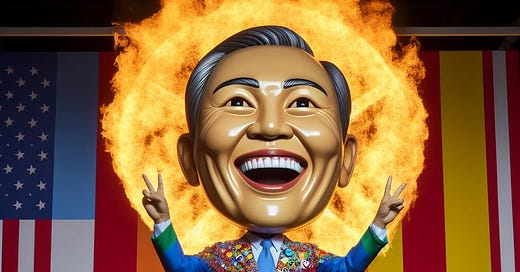The Falsehood Behind The Disguises: Vedantic Reflections On COP28.
"For the sake of the belly, one assumes many forms" (Śaṅkara).
The president of Cop28, the United Nations conference on climate that is taking place in Dubai from November 30 to December 12, 2023, is Sultan Ahmed Al Jaber, CEO of the state oil company of the United Arab Emirates, the Abu Dhabi National Oil Company (ADNOC). His appointment sparked controversy and doubts about his impartiality and credibility, given the key role of oil and gas in the economy and emissions of the Emirates. Al Jaber, who is also Minister of Industry and Technology and Special Envoy for Climate of the Emirates, will have the task of guiding negotiations between the signatory countries of the 2015 Paris Agreement and verifying progress made in reducing greenhouse gas emissions.
This hypocritical situation reminded me of a famous verse by Śaṅkara, the great Vedantic philosopher of classical India. In the devotional hymn Bhaja Govindam, Śaṅkara writes:
jaṭilo muṇḍī luñjita keśaḥ
kāśhāyānbara bahukṛta veśhaḥ |
paśyannapi cha na paśyati
mūḍhaḥ udara nimittaṃ
bahukṛta veśhaḥ ‖ 15 ‖
Which can be translated as:
"There are many (ascetics) with knotted hair, many with shaved heads, many with hair torn here and there; Some are dressed in orange, others parade in various colours - In truth, these different disguises or clothes are only for their stomach. Seeing the revealed truth in front of them, the fools still cannot see through these many disguises."
Read My Novella: Shankara's Bhaja Govindam - Chronicle of an Abduction in Varanasi.
When I first read about the life and teachings of Adi Shankara, I was struck by how much spiritual wisdom and insight this 8th-century philosopher possessed. Shankara revived and reinterpreted the ancient philosophy of Advaita Vedanta, teaching radical ideas of non-duality and the illusion of separateness. His verses known as the Bhaja Govindam inspire …
Śaṅkara is criticizing all those who wear the garments and exterior signs of asceticism, but in reality, they are attached solely to the satisfaction of material needs. They have no interest in spiritual research or liberation (mokṣa), they are simply hypocrites who exploit their position to accumulate food and worldly pleasures.
We can easily draw a parallel with the delegates and representatives of the various Countries at Cop28. Even they, like the ascetics criticized by Śaṅkara, wear a "mask" of commitment and climate responsibility, except then behave in reality exactly the opposite, putting their economic interests before those of the planet and of future generations.
It is an attitude that Śaṅkara brands as typical of fools (mūḍha), blinded by metaphysical ignorance (avidyā) and incapable of seeing the Truth even when it manifests itself before them. A truth that reminds us, to use the words of Pope Francis taken up in Cop28, how “the devastation of creation is an offence to God” and how “the hour is urgent” to act.
Instead of being guided by a materialistic and egoistic vision of life, world leaders would do well to remember the Vedantic teachings on the unity of all beings (ekatva) and our responsibility towards the entire cosmos. Only by abandoning the false identification with the limited body and mind is it possible to rediscover one's true nature as Ātman, the Universal Soul that permeates every atom of the manifested universe.
Śaṅkara himself, moreover, warns us against believing that true knowledge can be the prerogative of monks and ascetics alone. In his philosophical works, he explains how even a layman, a family man immersed in material life, can achieve Self-realization if inwardly detached. Authentic asceticism lies in mind control, not in outward signs.
Perhaps then, instead of worrying about their immediate gains, the powerful of the Earth could rediscover a lay but spiritually oriented ethos, which would allow them to act wisely for the common good and the safeguarding of the cosmic Dharma (ṛta). That Dharma governs the harmony of the entire universe and of which man is only a guardian, not the uncontested master.
An interesting model could be the one embodied by the tradition of grhastha, the "spiritual heads of families" of Vedanta, who while living in the world knew how to preserve a simple, sustainable lifestyle, respectful of the surrounding environment and permeated with high values. An ideal that is more current and necessary than ever today.
As Śaṅkara reminds us again, true renunciation and asceticism (tapas) lies not in mere outward signs, but in an inner transformation, in a "clothing" of the Spirit that leads from ignorance to Wisdom. That universal Wisdom recognizes the one Truth in all names and forms, the same divine Light that shines in every creature.
Perhaps the challenge of Cop28 and our time is precisely this: to stop wearing the clothes of hypocritical "transvestites", obsessed only with material needs, and to rediscover one's true spiritual identity as children of the Infinite. Letting oneself be inspired by the timeless teaching of that immortal Vedantic master who was Śaṅkara.
I have woven tales to share, for any who care to read them. My books await you on Google Books. Check also my stories on Medium.com.
I would be honoured if you considered subscribing to the Premium Contents of my Vedanta Substack and leaving feedback, comments, and suggestions both on this page and by writing to me at cosmicdancerpodcast@gmail.com.
Thank you for your precious attention.





